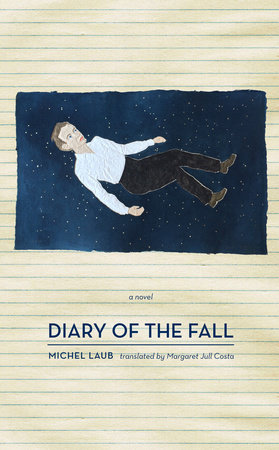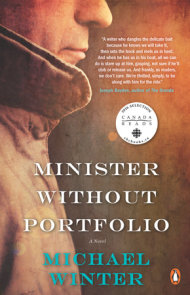TEACHING GUIDE
NOTE TO TEACHERS
Diary of the Fall
By Michel Laub
TEACHING GUIDE
Overview
Book Summary
In a series of diary entries, the unnamed Jewish narrator details a cruel prank he participated in when he was younger that left the only Catholic student at his elite Jewish school terribly injured. He examines the episode from different angles and tries to understand it within the context of his family history: his father has Alzheimer’s and obsessively records every memory that comes to mind, and his grandfather was an Auschwitz survivor who wrote his own diary but never once mentioned his experiences during the Holocaust.
Personal reflection and heartfelt consideration of the place history holds in our lives lead to a poignant and hopeful resolution to one man’s struggles with what he inherits from his father and grandfather.
Contains mature content. You may want to preview before reading aloud.
Teaching the Book
How do you navigate the stories your family creates for itself? How do those stories interact with those we make for ourselves and with history? Diary of the Fall is a meditation on the intersection of family and history that provides students with the opportunity to analyze Jewish identity in the 21st century and the role of history in shaping personal narratives.
Theme Focus: Identity; History vs. Personal Life
Comprehension Focus: Narrative Structure
Language Focus: Evocative Adjectives
Get Ready to Read
Pre-reading Activities
Preview and Predict: Discuss with students the title and cover of the book. Consider these questions:
1. Do you think the book will have chapters, or will it be written like a personal diary, with dates for separate sections?
2. What does the man on the cover of the book make you think of?
Brainstorming: Have the students read the book jacket description. Ask the students what they know about the Holocaust. How do they know it—did they learn it from school or from family and friends? Ask the students to think about the difference between knowing about something from being taught about it and knowing about something from personal experience.
Vocabulary
Explain to the students that the author uses adjectives that eloquently describe the ideas he explores. These adjectives help to pierce through the narrator’s confusion so the narrative can come to a conclusive understanding. The following list contains some of these words.
Ask students to write down what they think the following words mean as they come upon them. Afterwards, have them look up the words and write down their definitions. Have students compare their own definitions with the ones the dictionary provides and decide which one they think applies better and why.
1. condemnatory (p.13)
2. abstract (p. 13)
3. banal (p. 31)
4. inexplicable (p. 64)
5. vulnerable (p. 71)
6. profound (p. 103)
7. systematic (p. 120)
8. ethnic (p. 157)
9. symbolic (p. 201)
10. gratuitous (p. 224)
Using Vocabulary: Ask students to refer to the definitions they wrote for the above words to answer the following questions.
1. What abstract moral is the narrator referring to on page 13?
2. What about the narrator’s grandfather’s actions is inexplicable?
3. Who else, beside the narrator’s father on page 71, is shown to be vulnerable?
4. Do you think the novel’s structure is systematic in the way the narrator describes on page 120?
5. What is the difference between how the word gratuitous is used on page 186 and how it is used on page 224?
As You Read
Reading the Book:
Modeled Reading: Read aloud from the first few pages of the book. Ask students to consider the length and cadence of the sentences, and why the author chose to write in such a way. When they read on their own ask them to consider the difference in how they read the sentences.
Textual Analysis: Ask students to keep this question in mind as they read the book, and to point to sentences or passages from the book to support their answer: Do you think the novel says anything definitive about the nature of cruelty?
Reading Comprehension
Narrative Structure: Ask students to make a graph showing the grandfather’s actions, the father’s actions, and the narrator’s actions, and how the three are interrelated.
After You Read
Questions
Comprehension Focus
On Narrative Structure: What is the purpose of repetition in the novel? (See “hygiene,” pp 39, 111, 142; “Auschwitz,” pp 143, 150–151; “a repetition of what I did on his birthday,” p 176; “because that would be a reminder of what I was capable of doing to him over and over again,” p 177; “the nonviability of human experience at all times and in all places,” pp 205, 215, 217.)
Theme Focus
On History vs Personal Life: What is “the fall” that the title of the novel references? Does it manifest in more than one way? Does “the fall” seem to have the same effect on João that it has on the narrator? Is there more than one character who suffers through a “fall”?
Language Focus
Have the students choose one of the evocative adjectives from the above list and use it tin a one-paragraph review of the book.
Content Area Connections
History: Have students research the history of the Jewish diaspora after WWII, with a focus on migration to South America.
Language Arts: Have students write a 500 word diary imitating Laub’s writing style.
Arts: Have students create a new cover for the book.
Extension Activities
Compare and Contrast: The novel is intertextual, in that it directly references other books that speak about the Holocaust and Holocaust survivors. Ask students to consider how the book compares to other books they’ve read about the Holocaust, and how Diary of the Fall has added to or changed their knowledge about it. Remind them about the pre-reading brainstorming activity they completed where they thought about what they knew about the Holocaust.
About the Author
Michel Laub was born in Porto Alegre and currently lives in São Paulo, Brazil. He is a writer, a journalist, and the author of five novels. Diary of the Fall is his first to be published in English, and has won the Brasilia Award and the Bravo!/Bradesco Prize. Laub was named one of Granta’s twenty Best Young Brazilian Novelists in 2012.
×
Become a Member
Just for joining you’ll get personalized recommendations on your dashboard daily and features only for members.
Find Out More Join Now Sign In





















